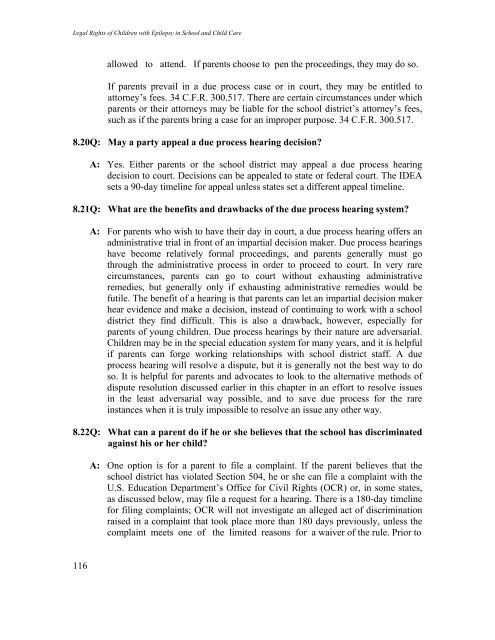Legal Rights of Children with Epilepsy in School & Child Care
Legal Rights of Children with Epilepsy in School & Child Care
Legal Rights of Children with Epilepsy in School & Child Care
Create successful ePaper yourself
Turn your PDF publications into a flip-book with our unique Google optimized e-Paper software.
<strong>Legal</strong> <strong>Rights</strong> <strong>of</strong> <strong><strong>Child</strong>ren</strong> <strong>with</strong> <strong>Epilepsy</strong> <strong>in</strong> <strong>School</strong> and <strong>Child</strong> <strong>Care</strong><br />
allowed to attend. If parents choose to pen the proceed<strong>in</strong>gs, they may do so.<br />
If parents prevail <strong>in</strong> a due process case or <strong>in</strong> court, they may be entitled to<br />
attorney’s fees. 34 C.F.R. 300.517. There are certa<strong>in</strong> circumstances under which<br />
parents or their attorneys may be liable for the school district’s attorney’s fees,<br />
such as if the parents br<strong>in</strong>g a case for an improper purpose. 34 C.F.R. 300.517.<br />
8.20Q: May a party appeal a due process hear<strong>in</strong>g decision?<br />
A: Yes. Either parents or the school district may appeal a due process hear<strong>in</strong>g<br />
decision to court. Decisions can be appealed to state or federal court. The IDEA<br />
sets a 90-day timel<strong>in</strong>e for appeal unless states set a different appeal timel<strong>in</strong>e.<br />
8.21Q: What are the benefits and drawbacks <strong>of</strong> the due process hear<strong>in</strong>g system?<br />
A: For parents who wish to have their day <strong>in</strong> court, a due process hear<strong>in</strong>g <strong>of</strong>fers an<br />
adm<strong>in</strong>istrative trial <strong>in</strong> front <strong>of</strong> an impartial decision maker. Due process hear<strong>in</strong>gs<br />
have become relatively formal proceed<strong>in</strong>gs, and parents generally must go<br />
through the adm<strong>in</strong>istrative process <strong>in</strong> order to proceed to court. In very rare<br />
circumstances, parents can go to court <strong>with</strong>out exhaust<strong>in</strong>g adm<strong>in</strong>istrative<br />
remedies, but generally only if exhaust<strong>in</strong>g adm<strong>in</strong>istrative remedies would be<br />
futile. The benefit <strong>of</strong> a hear<strong>in</strong>g is that parents can let an impartial decision maker<br />
hear evidence and make a decision, <strong>in</strong>stead <strong>of</strong> cont<strong>in</strong>u<strong>in</strong>g to work <strong>with</strong> a school<br />
district they f<strong>in</strong>d difficult. This is also a drawback, however, especially for<br />
parents <strong>of</strong> young children. Due process hear<strong>in</strong>gs by their nature are adversarial.<br />
<strong><strong>Child</strong>ren</strong> may be <strong>in</strong> the special education system for many years, and it is helpful<br />
if parents can forge work<strong>in</strong>g relationships <strong>with</strong> school district staff. A due<br />
process hear<strong>in</strong>g will resolve a dispute, but it is generally not the best way to do<br />
so. It is helpful for parents and advocates to look to the alternative methods <strong>of</strong><br />
dispute resolution discussed earlier <strong>in</strong> this chapter <strong>in</strong> an effort to resolve issues<br />
<strong>in</strong> the least adversarial way possible, and to save due process for the rare<br />
<strong>in</strong>stances when it is truly impossible to resolve an issue any other way.<br />
8.22Q: What can a parent do if he or she believes that the school has discrim<strong>in</strong>ated<br />
aga<strong>in</strong>st his or her child?<br />
A: One option is for a parent to file a compla<strong>in</strong>t. If the parent believes that the<br />
school district has violated Section 504, he or she can file a compla<strong>in</strong>t <strong>with</strong> the<br />
U.S. Education Department’s Office for Civil <strong>Rights</strong> (OCR) or, <strong>in</strong> some states,<br />
as discussed below, may file a request for a hear<strong>in</strong>g. There is a 180-day timel<strong>in</strong>e<br />
for fil<strong>in</strong>g compla<strong>in</strong>ts; OCR will not <strong>in</strong>vestigate an alleged act <strong>of</strong> discrim<strong>in</strong>ation<br />
raised <strong>in</strong> a compla<strong>in</strong>t that took place more than 180 days previously, unless the<br />
compla<strong>in</strong>t meets one <strong>of</strong> the limited reasons for a waiver <strong>of</strong> the rule. Prior to<br />
116








